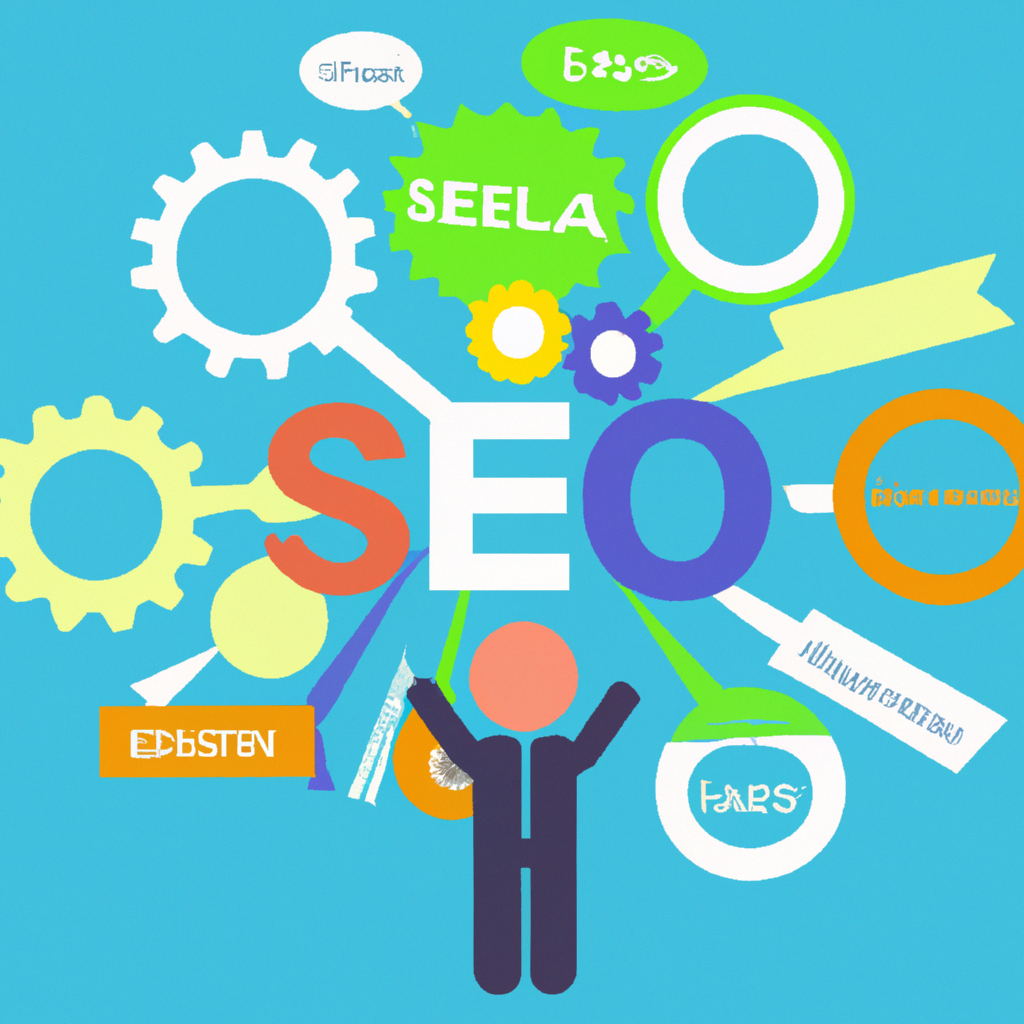What Is Search Engine Optimization? You may have heard the term “search engine optimization” thrown around in conversations about websites and online visibility, but do you really know what it means? Search engine optimization, often abbreviated as SEO, refers to the process of improving a website’s visibility and ranking on search engine results pages. It involves making tweaks and adjustments to various aspects of a website, such as content, design, and structure, in order to make it more appealing and easily discoverable by search engines like Google. By understanding the fundamentals of SEO, you can effectively optimize your website and attract more organic traffic, leading to higher engagement and potential conversions.
What is Search Engine Optimization?
search engine optimization (SEO) refers to the practice of optimizing a website or web page to improve its visibility and ranking in the search engine results pages (SERPs). In simple terms, it involves making changes to your website design and content to make it more attractive to search engines like Google, Bing, and Yahoo. By implementing SEO techniques, you can increase the chances of your website being found by users who are searching for relevant keywords or phrases related to your business or industry.

Definition of Search Engine Optimization
Search Engine Optimization can be defined as the process of enhancing your website’s visibility and ranking in the organic (non-paid) search engine results. It involves various techniques and strategies, both on-page and off-page, with the aim of increasing relevant traffic to your website. The ultimate goal of SEO is to improve the user experience and ensure that search engines understand and rank your website higher than competitors when relevant queries are made.
Importance of Search Engine Optimization
In today’s digital age, where the internet plays a significant role in our daily lives, having a strong online presence is crucial for businesses of all sizes. Search Engine Optimization is essential for several reasons:
- Increased visibility: By optimizing your website for search engines, you can ensure that your business gets noticed by a wider audience. When your website ranks higher in the search results, users are more likely to click on it, resulting in increased visibility and exposure.
- Targeted traffic: SEO allows you to attract highly targeted traffic to your website. By optimizing your content for specific keywords or phrases that are relevant to your business, you can attract users who are searching for exactly what you offer. This targeted traffic is more likely to convert into leads or customers, increasing your chances of business success.
- Cost-effective marketing: Compared to traditional forms of marketing, such as print or television advertising, SEO is a cost-effective strategy. While it may require an initial investment of time and resources, the long-term benefits of increased organic traffic and visibility can far outweigh the costs.
- Builds credibility and trust: When your website appears at the top of the search results, users perceive it as more reputable and trustworthy. SEO helps to establish your brand as an authority in your industry, as search engine rankings are often seen as an endorsement by the search engine itself.
Types of Search Engines
Search engines are online platforms that allow users to search for information, products, and services on the Internet. While Google is the most popular search engine worldwide, there are several others, each with its own unique algorithms and user base. The main types of search engines include:
- Google: As the most widely used search engine, Google holds the majority of the search market share. It utilizes complex algorithms to deliver highly relevant search results to users based on their search queries.
- Bing: Bing is the second-largest search engine and is owned by Microsoft. It provides users with web search, image search, video search, and map search functionalities.
- Yahoo: Yahoo is an internet portal that includes a search engine. It has a partnership with Bing, with Bing providing the search results for Yahoo’s search engine.
- DuckDuckGo: DuckDuckGo is a privacy-focused search engine that does not track user data. It aims to provide users with unbiased search results and emphasizes privacy protection.
- Yandex: Yandex is a Russian search engine that is widely used in Russia and other Russian-speaking countries. It offers various search services, including web search, image search, video search, and more.
Evolution of Search Engine Optimization
Search Engine Optimization has come a long way since its inception. In the early days of the Internet, search engines relied on simple algorithms that primarily focused on keyword density. Website owners could easily manipulate their rankings by stuffing their web pages with keywords, regardless of the quality of the content.
As search engines became more sophisticated, they started incorporating various factors into their algorithms to determine the relevance and quality of a webpage. This led to the evolution of SEO techniques, such as link building, content optimization, and user experience improvement.
In recent years, search engines have become even more advanced, with the introduction of artificial intelligence and machine learning technologies. This has resulted in search engines being able to understand user intent and deliver more personalized and accurate search results.

Role of Search Engine Optimization in Digital Marketing
Search Engine Optimization plays a crucial role in digital marketing strategies. It helps businesses improve their online presence, reach their target audience, and drive valuable organic traffic to their website. Here are some key ways in which SEO contributes to digital marketing success:
- Increases organic traffic: By optimizing your website for search engines, you can attract organic traffic from users who are actively searching for products or services related to your business. This traffic is valuable as it has a higher chance of conversion compared to other sources, such as paid advertisements.
- Improves brand visibility: When your website appears at the top of the search results, it increases brand visibility and recognition. Users are more likely to trust and choose a brand that consistently appears in the top search results, making SEO an essential tool for building brand awareness.
- Supports other digital marketing channels: SEO works in synergy with other digital marketing channels, such as content marketing, social media marketing, and paid advertising. By aligning your SEO efforts with your overall digital marketing strategy, you can amplify the results of your campaigns and create a holistic online presence.
- Enhances user experience: Search Engine Optimization involves optimizing your website’s design, structure, and content to improve the user experience. Websites that prioritize user satisfaction and engagement are more likely to rank higher in the search results, resulting in increased traffic and conversions.
- Long-term sustainability: Unlike paid advertising, which stops generating traffic once the ad campaign ends, SEO provides long-term sustainability. By consistently implementing SEO best practices, you can maintain and improve your search engine rankings over time, driving continuous organic traffic to your website.
Benefits of Search Engine Optimization
Implementing an effective SEO strategy can provide numerous benefits for your business. Here are some key advantages of investing in Search Engine Optimization:
- Increased website traffic: By optimizing your website for relevant keywords, you can attract more organic traffic from search engines. As your website ranks higher in the search results, more users will click on your link, resulting in increased website traffic.
- Higher conversion rates: When your website attracts targeted traffic from users who are actively searching for what you offer, the chances of conversions and sales are higher. SEO helps you narrow down your target audience and reach users who are more likely to convert into customers.
- Cost-effective marketing: Compared to other digital marketing channels, SEO offers a cost-effective way to attract high-quality traffic to your website. While there may be initial costs involved in implementing SEO strategies, the long-term benefits of higher rankings and increased visibility make it a valuable investment.
- Improved user experience: SEO involves optimizing your website’s design, structure, and content to improve the user experience. Websites that are easy to navigate, load quickly, and provide valuable information will attract more visitors and increase the chances of conversions.
- Competitive advantage: In today’s competitive digital landscape, having a strong SEO presence can give your business a competitive edge. When your website consistently ranks higher than your competitors in search engine results, users are more likely to choose your products or services over others.

Key Components of Search Engine Optimization
To effectively optimize your website for search engines, it is important to understand the key components of SEO. These components work together to improve your website’s visibility, ranking, and user experience. The main components of Search Engine Optimization include:
- Keyword research: Keyword research involves identifying the keywords or phrases that your target audience is using to search for information related to your business. By targeting these keywords in your content, you can attract more relevant organic traffic.
- On-page optimization: On-page optimization refers to optimizing the elements on your website’s individual web pages. This includes optimizing meta tags, headings, URLs, and content to ensure they align with target keywords and provide a positive user experience.
- Off-page optimization: Off-page optimization involves activities that take place outside of your website to improve its visibility and reputation. This includes link building, social media engagement, online directory listings, and influencer collaborations. Off-page optimization helps search engines understand the relevance and authority of your website.
- Technical SEO: Technical SEO focuses on optimizing the technical aspects of your website to improve its crawling and indexing by search engines. This includes optimizing website speed, mobile-friendliness, URL structure, XML sitemaps, and robots.txt files.
- Content optimization: Content optimization involves creating high-quality, valuable, and engaging content that is optimized for search engines. This includes incorporating target keywords, optimizing headings and subheadings, using relevant images and videos, and ensuring the content satisfies user search intent.
On-Page Optimization Techniques
On-page optimization techniques involve optimizing the elements within individual web pages to improve their visibility in search engine results. Here are some key on-page optimization techniques to consider:
- Keyword optimization: Incorporate target keywords naturally within your content, headings, meta tags, and URLs. However, avoid keyword stuffing, as it can have a negative impact on your rankings.
- Page titles and meta descriptions: Craft compelling and keyword-rich page titles and meta descriptions that accurately describe the content of your web page. These elements appear in the search engine results and can significantly impact click-through rates.
- Header tags: Use header tags (H1, H2, H3, etc.) to structure your content and help search engines understand the hierarchy and relevance of your information. Incorporate target keywords in your headers to further enhance optimization.
- URL structure: Create descriptive and user-friendly URLs that include relevant keywords and accurately represent the content of the web page. Avoid using long, complex URLs with unnecessary parameters.
- Optimized images: Use descriptive file names and alt tags for your images to help search engines understand their context. Optimized images can also improve the user experience and reduce page load times.

Off-Page Optimization Techniques
Off-page optimization techniques involve activities that take place outside of your website to improve its visibility and reputation. Here are some key off-page optimization techniques to consider:
- Link building: Build high-quality backlinks from reputable websites to increase your website’s authority and ranking. Focus on acquiring natural and relevant links from sources that have content related to your industry.
- Social media engagement: Engage with your audience on social media platforms to increase brand awareness and drive traffic to your website. Share valuable content, encourage social sharing, and participate in discussions related to your niche.
- Online directory listings: List your business in relevant online directories and local business listings to improve your online visibility and reach a wider audience. Ensure that your business information is accurate and consistent across all listings.
- Guest blogging: Contribute guest posts to reputable websites and blogs in your industry. This allows you to showcase your expertise, build relationships with other industry professionals, and gain exposure to a new audience.
- Influencer collaborations: Collaborate with influencers or industry experts to create valuable content and reach a wider audience. Influencers can help promote your brand and drive traffic to your website through their established following.
Common Practices and Strategies in Search Engine Optimization
Effective Search Engine Optimization requires a combination of various practices and strategies. Here are some common practices to consider when implementing SEO for your website:
- Regular content updates: Regularly update your website with fresh and valuable content. This not only improves your website’s visibility in search engine results but also encourages users to return to your website for new information.
- Mobile optimization: Optimize your website to ensure it is mobile-friendly and responsive. With the increasing use of mobile devices, search engines prioritize mobile-friendly websites for better user experience.
- Site speed optimization: Improve your website’s loading speed by optimizing images, minifying code, and utilizing caching techniques. A faster website not only improves user experience but also has a positive impact on search engine rankings.
- User experience optimization: Enhance the overall user experience of your website by improving navigation, reducing clutter, and ensuring easy access to relevant information. User-friendly websites are more likely to rank higher in search engine results.
- Regular monitoring and analysis: Continuously monitor your website’s performance using analytics tools and adjust your SEO strategies accordingly. Regular analysis helps identify areas for improvement and maximizes the effectiveness of your SEO efforts.
In conclusion, Search Engine Optimization is an essential aspect of digital marketing that can significantly impact the success of your online presence. By implementing effective SEO techniques, you can improve your website’s visibility, attract targeted traffic, and increase conversions. Understanding the key components and strategies of SEO will enable you to optimize your website for search engines and achieve long-term success in the digital landscape.




